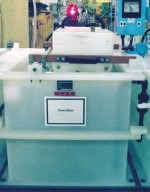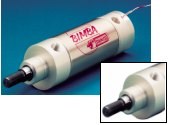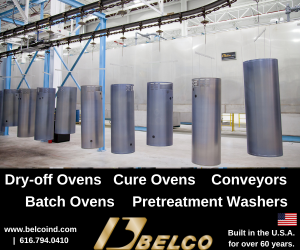Streamlining Assembly at Bimba Manufacturing
Process integrated into company-wide computerized maintenance program...
When your product line features actuators with thousands of standard models, sizes and styles, many of which require blackening, you must have a well-planned, smooth-operating finishing system. At Bimba Manufacturing Company, Monee, IL, rapid growth and a desire to improve quality and delivery lead the company to invest in an in-house blackening system that added capacity and flexibility while improving overall finished part quality.
Bimba is a leading manufacturer of an extensive line of air cylinders, rotary actuators, linear thrusters, rodless cylinders, flow controls and position sensing cylinders. These products are used in machinery and automation in many industries. Bimba manufactures and sells these devices to original equipment manufacturers and end-users throughout the world.
Many of these actuators have customized lengths, bores and other special features. Yet the company is able to manufacture these products to customer requirements without difficulty, according to Bruce Croix, manufacturing engineer at Bimba. To do this consistently, a finely tuned manufacturing operation is paramount.
Production testing. Upgrading a finishing line involves both equipment and chemical products. Mr. Croix proceeded in a deliberate manner so as to minimize risk to the company. Since Bimba already owned a process line (albeit an old one) that was still operating, it made sense to use it to evaluate new chemical processes.
"We needed a cold blackening process that worked consistently and was easy to maintain," reported Mr. Croix. "We needed a supplier that could provide us with a customized process that would work well for our products and deliver as we needed it without startup problems. Operator safety was an issue also since we didn't want the problems of a hot oxide line. We knew about Birchwood Casey, so we called the company in to see what it could do."
Bimba started using the customized Presto Black process in its existing line. "It worked from the start, and it worked well," Mr. Croix noted. "The key is keeping the blackening tanks clean and charged with proper strength formulations. That was accomplished with fairly simple operator training. Once we were comfortable with the process on our existing finishing line, it was fairly easy to design the new system around that process."
Employee input helps fine-tuning. Bimba involves the operators in the system purchasing decision because it makes the startup process a lot easier. "We had their input on what they liked and didn't like about the old and new processes. They really talked a lot about quality issues and how to achieve consistent results. They addressed process maintenance and time to produce parts. They helped to determine optimum tank sizes to handle the range of part sizes in the volumes that our orders require.
"An important issue for the employees involved with the finishing system was the design of a computerized maintenance program to ease operation. At Bimba, employees responsible for acquiring any new system, process or machine are also responsible for designing the maintenance process to keep it operating and producing products of consistent quality.
"One of our manufacturing engineers, Ron Neis, worked closely with us to dovetail the blackening process parameters into Bimba's plant-wide computerized maintenance program. The well-defined finishing process was relatively easy to incorporate into this program because it was simple and straightforward to operate and maintain. Our employees' ideas on all of these factors helped to better define the requirements and specifications of the system, and it helped to pre-sell the system to the people who must approve the capital expenditure."
Process takes 15 to 20 minutes. Bimba's workers learned to operate and maintain the system in a single day. The process steps are as follows:
- Clean and degrease in an agitated washer operated at 125F for 5 to 10 minutes on the dwell to remove fabricating oils and coolants.
- Rinse in cold tap water.
- Prepare the surface for blackening by immersing the part in Presto Prep mild acid conditioner at room temperature for 1½-min.
- Rinse in cold tap water.
- Blacken in Presto Black PBR at room temperature with 3 to 4 minutes dwell time.
- Rinse in cold tap water.
- Seal in Sheath WS-12 rust preventive.
The entire 15- to 20-minute process requires just one operator and uses only two heated solutions, with all other process steps at room temperature. The seven process tanks vary in size from 40 to 105 gal. The seventh tank also acts as a drop-off station for the process hopper after which finished parts are moved to an area for a light oil application. A manual hoist is positioned above the full width of the finishing system so that the operator can easily move larger part loads in batches through the series of tanks.
Mr. Croix estimates that about 2,000 parts of various sizes are finished each workday. The majority of these are carbon steel rods, many with threaded ends. They range in length from 1 to 36 inches and diameters from 1/8 to 7/8 inch. On average, the system operates fours hours or less Monday through Friday. The system's heaters are connected to timers that operate automatically, so the system is ready to go when the work shift begins. The system automatically shuts down each day unless an operator intervenes to run it longer.
Mr. Croix reported that the only time a problem was encountered was when an operator forgot to replenish the chemical solution. A simple titration test was done to secure the correct chemical balance and the system was operating properly without any significant loss of processing time.
Once the chemistry had proven itself in the old process line at the Monee facility, a new tank line was purchased that incorporated all the processing suggestions offered by the operators. From there, it was an easy step to justify a second installation identical to the first. This was installed at the new Manteno, IL, facility. The two lines operate simultaneously, with the Manteno facility dedicated to higher volume sizes and the Monee line processing specials and lower-volume runs. With both lines operating, all of the production can be blackened on the same day without interruptions.
"Making both finishing system changes was fairly easy," reported Mr. Croix. "We did it in the same way we would add any other piece of capital equipment. It is a good process and a good system."
To learn more visit Birchwood Technologies and Hardwood Line Mfg. Corp..
Read Next
Episode 45: An Interview with Chandler Mancuso, MacDermid Envio Solutions
Chandler Mancuso, technical director with MacDermid Envio discusses updating your wastewater treatment system and implementing materials recycling solutions to increase efficiencies, control costs and reduce environmental impact.
Read MoreDelivering Increased Benefits to Greenhouse Films
Baystar's Borstar technology is helping customers deliver better, more reliable production methods to greenhouse agriculture.
Read MoreEducation Bringing Cleaning to Machining
Debuting new speakers and cleaning technology content during this half-day workshop co-located with IMTS 2024.
Read More












.jpg;maxWidth=300;quality=90)








